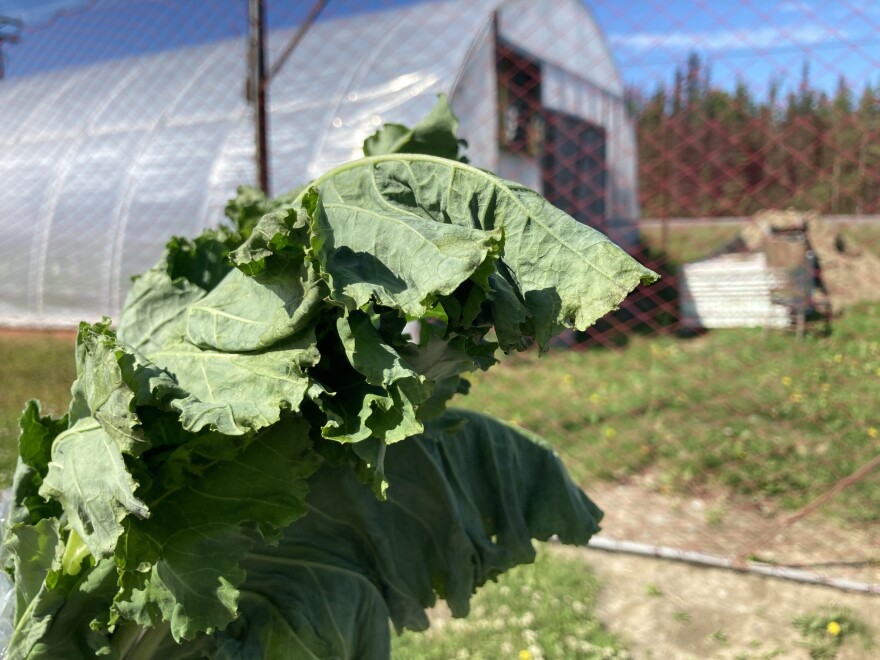The COVID-19 pandemic has interrupted just about everything, including food shipments to grocery stores all over Alaska. Last year, Alaskans really felt it, with some products just not available.
Alaska depends on shipments for about 95 percent of its food, which makes the state fragile when those supply lines are interrupted. Reportedly, interest in local food has grown during the pandemic as well—good news for the Kenai Peninsula, which was home to more than 250 farms in 2017, according to the U.S. Department of Agriculture. Farmers and local food advocates have stood on that fact to push for more in-state food production support and infrastructure, and with the pandemic highlighting food insecurity, they are taking the opportunity to push for broader changes.
The Alaska Food Policy Council, a Homer-based nonprofit that advocates for improvements in the state food system, issued a set of recommendations for improving food security in the state at the end of June. Key to the recommendations are the funds coming through the American Rescue Plan Act, a major aid package meant to help mitigate the impacts of the pandemic.
Food insecurity spiked during the pandemic as people lost their jobs. Cara Durr, the director of public engagement for the Food Bank of Alaska, said the pandemic made food insecurity suddenly a very real topic of conversation. Durr is also on the board of the Alaska Food Policy Council.
"It became a very, very visible outcome of the pandemic, with food insecurity rates really dramatically rising," she said. "I think (the awareness) one of the really positive things to come out of the pandemic. Food is everything—we need to make sure we have a strong food system that supports our state, supports our growers."
Food insecurity doesn’t just necessarily mean a lack of food—it can also mean nutritionally poor foods. Fresh foods tend to be more expensive, particularly in rural areas of Alaska away from Anchorage or other urban centers. That can mean that families in need may make compromises on the health of what they’re buying, Durr said.
One of the recommendations from the Food Policy Council is to invest in cold storage, particularly in rural areas. Expanding infrastructure like cold storage would allow for more fresh produce to make it to areas that may not have access to it now. For example, The Kenai Peninsula Food Bank purchased a refrigerated truck last year, which allowed it to take perishables like fresh milk to more remote communities.
Another recommendation is to invest in local food purchasing programs, where the state would provide funds for food banks to purchase locally produced food and distribute it. The Food Bank of Alaska participates in something like this now, but not formally, Durr said. She said it doesn’t have to take a particular form, but that there seems to be support for it.
"The feedback we’ve been hearing is there is a strong interest in finding ways to support local growers (and) local producers," she said. "There is a strong desire to make sure people are adequately fed. We have seen really high levels of hunger during the pandemic. This is a program that is really hitting the sweet spot of satisfying both of those goals."
Other recommendations include investments in food system workforce development, transportation, improvements to importing livestock, in-state poultry production and kitchen, manufacturing and processing facilities. All are linked to the funding that could come to Alaska from the American Rescue Plan funds.
Durr says the Legislature has shown support for food system improvements. In 2021 so far, food insecurity has actually declined, according to national food security nonprofit Feeding America. However, Durr said that’s a reflection of how much the federal aid packages being injected into communities helped.
“We’re shooting for as much as we can get," she said. This is an area, food security, I think it just has a lot of bipartisan support. I think people across the board agree for the most part that some of these principles that we outlined are worthy.”
You can see more about the Alaska Food Policy Council’s recommendations on their website, akfoodpolicycouncil.org.
Reach Elizabeth Earl at elizabethearl@gmail.com.




